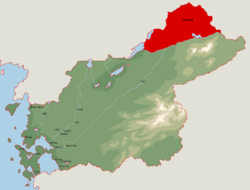Estoria
Estoria Puumaata | |
|---|---|
Autonomous region of Themiclesia | |
 | |
| Motto(s): Reach and further | |
 Estoria within Themiclesia | |
| Sovereign state | Themiclesia |
| Constitution Act of Estoria | 1870 |
| Government | Devolved parliamentary democracy |
• Prime Minister | Antton Tuomela |
• House Speaker | Kuisma Viinanen |
• Lord Speaker | Lord of Kam |
• Chief Justice | Nathan Netter |
| Legislature | Parliament of Estoria
|
| Area | |
• Total | 162,965 km2 (62,921 sq mi) |
| Population | |
• 2015 census | 184,000 |
| GDP (nominal) | 2018 estimate |
• Total | $7,590,000,000 |
• Per capita | $41,250 |
| Currency | ′Jik (€) (ARC) |
| Time zone | UTC+5 – +6 |
| Date format | dd-mm-yyyy |
| Driving side | left |
| Calling code | +105 |
Estoria or State of Estoria (耑邦, stor-prong) is an autonomous region of Themiclesia in its northeast. The 162,965 km² region borders Nukkumaa to its north and the autonomous region of Heraclea to its south. The capital city of the region is Apollonia, which is also the seat of its government. Estoria's population, as of 2015, is 184,000.
Etymology
History
Geography
Demographics
Religion
Politics and government
The structure of the Estorian government is found in the Constitution of Estoria Act passed by the Themiclesian parliament in 1870 and in several other laws. Furthermore, several unwritten principles that require responsible government, the rule of law, judicial independence, and fundamental individual rights and liberties are considered constitutional to Estoria.
Legislative
The Constitution Act recognizes that the Parliament of Estoria has exclusive power to impose direct taxes and regulate local hospitals, prisons, education, marriage, banking, social services, mining, forestry, industry, environmental protection, energy, and land and civil rights; however, foreign affairs, national defence, railways, postal service, currency, and criminal law are reserved to the Kien-k'ang Parliament. In the event of a dispute between the two legislatures, c. 19 of the Act gives the latter the deciding authority, though this section has never been invoked officially.
The same law provides that the Parliament of Estoria should consist of a House of Representatives and a House of Peers. Both houses must concur to pass legislation. The House of Representatives consists of 63 members elected directly in single-member districts under the first-past-the-post method, by Estorian citizens aged 18 or more. Representatives serve for terms up to five years, but the House may be dissolved upon the application of the prime minister prior to this time. Until to 1920, there had been a property qualification on the franchise. The House of Peers consists of 48 peers, 46 of whom are appointed for life by the emperor upon the prime minister's advice. The remaining two peers hold hereditary titles associated with Estoria. Peers must be at least 30 years of age to sit in the house, whether appointed or hereditary.
Executive
The executive functions of Estorian government rests on a cabinet of ministers collectively responsible to the state's parliament. The head of government is the Chancellor or Prime Minister, who may remain in office as long as his government does not lose the confidence of the House of Representatives. Other ministers are nominated by the Chancellor and appointed by the emperor. The Government is held accountable by both houses of the legislature through regular questions posed by their members to ministers and scrutiny of the executive's legislative agenda.
A number of government departments discharging general administration exist under the Government; these departments consist of officials appointed and dismissed independently of the political process.
Judicial
The civil and criminal jurisdiction are separate in Estoria as
